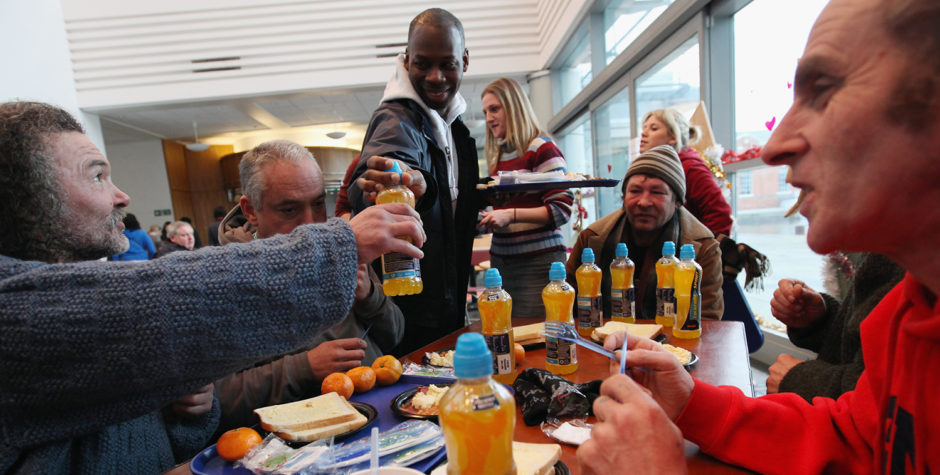ACLJ Secures Victory Allowing Church to Continue Ministering to the Needy
This week, the ACLJ secured another victory for a church experiencing difficulties in the zoning process.
Several weeks ago, Soul Food Café Mission, Inc. (SFCM), a faith-based religious organization, contacted the ACLJ regarding difficulties it was experiencing in obtaining the appropriate zoning approval to operate as a church and food ministry. SFCM reaches out to those hurting and in need with love, compassion, and hope through the sharing of the gospel and by meeting the immediate needs (such as food and clothing) of those in its community. The Directors of SFCM, Reverend Rick Harvey and his wife, Traci, have been serving their community for more than 25 years. Today, SFCM has over 75 volunteers who assist in distributing food and providing other much needed services to families and individuals on a weekly basis.
SFCM received a donation of property consisting of six acres and began working to prepare the property so that it could consolidate operation of its entire ministry (food distribution, food pantry, religious services) in one location. The property is ideal for SFCM and accommodates the long-term vision and goal of the ministry. However, the City, or nearby property owners, were not keen on allowing SFCM to continue its ministry at the new location. The primary obstacle to zoning approval by the City appeared to be opposition by nearby property owners, as well as a land developer with plans for some vacant property next door to SFCM’s property. Although the neighbors’ opposition was based on nothing more than unfounded concerns – all concerns discounted by the ministry’s reputable and long-time operation (16 years) in the community – the opposition was successful in preventing SFCM from obtaining the proper zoning permit to operate its ministry (which it hoped would, one day, include a homeless shelter).
Then, SFCM contacted the ACLJ for help. The ACLJ immediately contacted the City and began working to ensure that SFCM was granted the proper permit through a fair zoning process. SFCM, like all religious assemblies and ministries, is protected under the Religious Land Use and Institutionalized Persons Act (RLUIPA). RLUIPA is a federal law designed to protect religious assemblies and institutions from land use regulations that interfere with their religious exercise. As Senators Hatch and Kennedy recognized in their support of enacting RLUIPA:
The right to build, buy or rent space is an indispensable adjunct of the core First Amendment right to assemble for religious purposes. . . .
Churches in general, and new, small, or unfamiliar churches in particular, are frequently discriminated against on the face of zoning codes and also in the highly individualized and discretionary processes of land use regulation. Zoning codes frequently exclude churches in places where they permit theatres, meeting halls, and other places where large groups of people assemble for secular purposes. Or the codes permit churches only with individualized permission from the zoning board, and zoning boards use that authority in discriminatory ways.
RLUIPA prohibits the government from imposing or implementing land use regulations in a manner that imposes a substantial burden on religious exercise, unless the regulation is in furtherance of a compelling governmental interest and is the least restrictive means of furthering that interest.
In SFCM’s case, denial of a conditional use permit would result in a substantial burden on SFCM’s ministry. Further, and as ACLJ explained to the City on behalf of SFCM, the concerns expressed by neighbors in opposing SFCM’s ministry were not only unfounded here, but insufficient under federal law to justify denial of SFCM’s zoning permit.
As the ACLJ also explained to the City in this case, zoning ordinances that restrict churches may interfere with First Amendment rights to free speech and assembly. Any government wishing to restrict a church’s location or operation can only do so through content-neutral regulations and any such regulation(s) must be supported by “specific, concrete evidence.” Riverside Church v. City of St. Michael,205 F. Supp. 3d 1014, 1037 (D. Minn. 2016) (citing City of Renton v. Playtime Theatres, Inc., 475 U.S. 41, 46 (1986); Cornerstone Bible Church v. City of Hastings, 948 F.2d 464, 468 (8th Cir. 1991); Vineyard Christian Fellowship of Evanston, Inc. v. City of Evanston, 250 F. Supp. 2d 961, 980-81 (N.D. Ill. 2003)).
Fortunately for SFCM, the ACLJ was able to intervene on its behalf and ensure that SFCM obtained the zoning permit to which it was entitled. Earlier this week, SFCM was able to open its doors for the first time at its new location and continue its long-time ministry of providing hope to those in its community.
